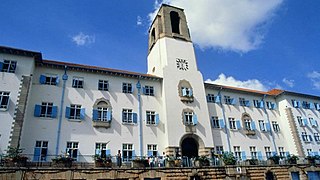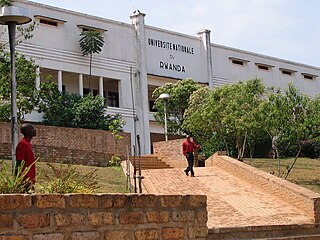
Southern Cross University (SCU) is an Australian public university, with campuses at Lismore and Coffs Harbour in northern New South Wales, and at Coolangatta, the most southern suburb of the Gold Coast in Queensland. In 2019, it was ranked in the top 100 young universities in the world by the Times Higher Education World University Rankings.

The University of Karachi is a public research university located in Karachi, Sindh, Pakistan. Established in June 1951 by an act of Parliament and as a successor to the University of Sindh, the university is a "Sindh Government University" and designed by Mohsin Baig as its chief architect.

Makerere University is Uganda's largest and oldest institution of higher learning, first established as a technical school in 1922, and the oldest currently active university in East Africa. It became an independent national university in 1970. Today, Makerere University is composed of nine colleges and one school offering programmes for about 36,000 undergraduates and 4,000 postgraduates. These colleges include College of Natural Sciences (CONAS), College of Health Sciences (CHS), College of Engineering Art & Design (CEDAT), College of Agriculture and Environmental Studies (CAES), College Of Business and Management Sciences (CoBAMS), College of Humanities & Social Sciences (CHUSS), College of Computing and Information Sciences (COCIS), College of Veterinary Medicine, Animal Resources & Bio-security (COVAB), College of Education and External Studies (CEES) and Makerere University Business School (MUBS). In addition, Makerere has onother campus in Eastern Uganda Jinja City.

The University of Cape Coast (UCC) is a public collegiate university located in the historic town of Cape Coast in the central region of Ghana. The campus has a rare seafront and sits on a hill overlooking the Atlantic Ocean. It operates on two campuses: the Southern Campus and the Northern Campus. Two of the most important historical sites in Ghana, Elmina and Cape Coast Castle, are a few kilometers away from its campus.

The National University of Rwanda was the largest university in Rwanda. It was located at 2°36′58″S29°44′34″E in the city of Butare and was established in 1963 by the government in cooperation with the Congregation of the Dominicans from the Province of Quebec, Canada. Its founder and first rector was Father Georges-Henri Lévesque.

Kenyatta University (KU) is a public research university with its main campus in Nairobi. It acquired the status of university in 1985, being the third university after University of Nairobi (1970) and Moi University (1984). As of October 2014, it was one of 23 public universities in the country.

Education in Rwanda has undergone considerable changes throughout Rwanda's recent history, and has faced major disruptions due to periods of conflict. Education was divided by gender whereby women and men had a different education relevant to their responsibilities in day-to-day life. Women were mostly taught housekeeping while men were mainly taught how to hunt, raise animals, and fish. This is because Rwanda was a community-based society where every member had a specific contribution to the overall development of the community. Older family members like grandparents usually took on the role of educators.

Strathmore University is a chartered university based in Nairobi, Kenya.

Abia State University Uturu (ABSU) is a Nigerian public university. It is one of the state-owned universities in Nigeria. These state academic institutions were created to expand admissions and bring professional skills, expertise and modern research facilities close to the city and rural dwellers, and have helped talented students to obtain higher education.

The Higher Colleges of Technology(HCT) (Arabic: كليّات التقنيّة العليا) is a public institute of technology with 16 campuses and facilities throughout the United Arab Emirates. Founded in 1988 by Sheikh Nahyan bin Mubarak al-Nahyan, it is the largest applied higher educational institution in the country.
The Adventist University of Central Africa (AUCA) also called in French: Universite Adventiste d'Afrique Central is a Seventh-day Adventist institution of higher learning near two campuses in Kigali, Rwanda. It is a part of the Seventh-day Adventist education system, the world's second largest Christian school system.

African Leadership University (ALU) is a network of tertiary institutions operating in Mauritius and Rwanda, offering bachelor's degree programs.
Israel Bimpe is a Rwandan pharmacist and blogger who is passionate about global health and social justice with a keen interest in global health policy and advocates for open access and improvement of health workforce education, particularly pharmacy education.
University of Global Health Equity (UGHE) is a health sciences university in Rwanda. An initiative of Partners In Health, UGHE is a private, not-for-profit, accredited institution.

The Akilah Institute is a non-profit college for women in Kigali, Rwanda. It is the first college for women in the country. The institute offers three-year diplomas in entrepreneurship, hospitality management, and information systems. Akilah is accredited through Rwanda's Ministry of Education.
Papias Malimba Musafiri, is a Rwandan academic, researcher and politician, who has served as the Minister of Education in the Rwandan cabinet, since 25 June 2015, replacing Prof. Silas Lwakabamba.
Alexandre Lyambabaje is a Rwandan mathematician, academician and politician. From February 2021 to May 2022, Prof. Lyambabaje served as vice-chancellor of the University of Rwanda. Prior to becoming vice chancellor, Prof. Lyambabaje was the secretary of Inter University Council of East Africa. Prof. Lyambabaje has also held various governmental positions, including minister of commerce and tourism, and serving as the permanent secretary to the minister of education.
Kayihura Muganga Didace is a Rwandan lawyer and academician. Since July 2022, he is serving as the Acting Vice Chancellor of the University of Rwanda.

The African Centre of Excellence in Data Science (ACE-DS) is a Rwandan educational institution focusing on data science. It is situated at the University of Rwanda, and was established in 2018 under the funding of the World Bank's Africa Centres of Excellence II Project.



















